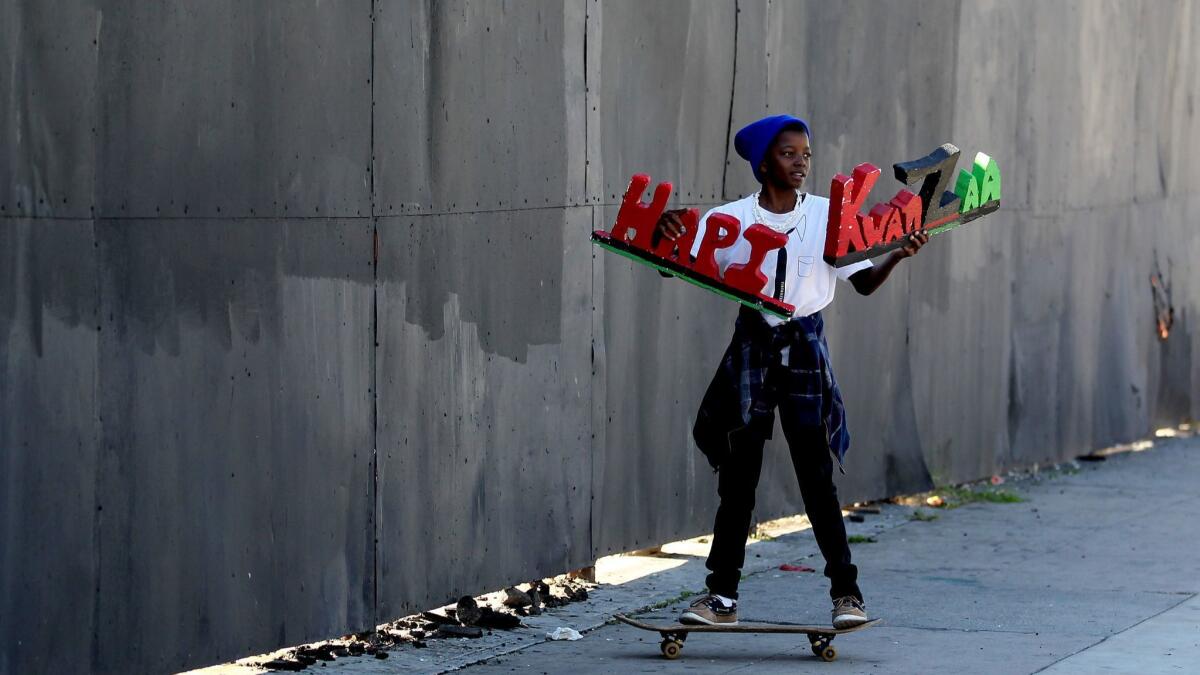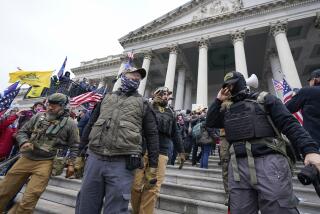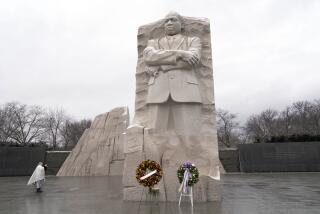Opinion: The dark side of Kwanzaa’s founder can’t extinguish the holiday’s beacon

I discovered Kwanzaa while attending Pomona College. Separated for the first time from my family and the black Pentecostal church I had attended at least three times a week, I craved black culture. There were fewer than 10 African American students in my cohort and I felt culturally isolated. Soul food lunches offered through the Office of Black Student Affairs were a weekly source of comfort.
Then I was introduced to the year-end celebration that had been created for black people by a black man. Maulana Karenga unveiled Kwanzaa in 1966 to fill the gaps where the U.S. had failed African Americans. Set against the backdrop of the civil rights movement, the seven-day celebration urged the African American community to define and uplift itself.
Karenga designed seven principles, or Nguzo Saba: unity, self-determination, collective work and responsibility, cooperative economics, purpose, creativity and faith. Each principle correlated to a specific day and symbol, to be celebrated Dec. 26 to Jan. 1.
Kwanzaa beckons us to the heights of our humanity, petitioning us to imagine ourselves and our communities in ways white American culture cannot and will not.
As the candles were lit each evening, we students were reminded to care for the collective. Celebrating Kwanzaa with my classmates assured me that I belonged.
Kwanzaa was attractive partly because it was FUBU — For Us, By Us, a cultural celebration that was distinctly ours, untainted by white supremacy. It was an annual reminder that #BlackLivesMatter before the hashtag emerged. It felt pristine, until it suddenly was sullied for me.
Two years ago, more than a decade after college, I was commissioned to write about the history of Kwanzaa. That’s when I learned that Karenga had been convicted of heinous felonies. Though he denied the allegations, in 1970 he and three other members of the US Organization, a black nationalist group based in Los Angeles, imprisoned and assaulted two female members. Trial testimony revealed that the women had been whipped with cords, beaten with batons, and seared with irons — while naked — in an effort to elicit confessions that they were conspiring against him. Those confessions never materialized. Karenga served a few years in prison and later went on to get his doctorate and teach.
My stomach lurched as I read about the trial and his conviction. Karenga was found guilty of violence against black women. How could Kwanzaa’s inventor be that person? What did it mean about the celebration I had embraced? Why did no one talk about his history? And I couldn’t help but wonder if Karenga’s history was elided because Kwanzaa’s viability was deemed more important than black women’s safety.
The discovery felt like a personal loss and a loss for black culture. And it left me with a dilemma — to embrace Kwanzaa or not. In ways, it’s similar to the dilemma faced by those who admire the work of artists who have been accused of sexual assault or harassment in the #MeToo era: Should we continue to admire the work of a person who has done unconscionable things?
Last year, I didn’t celebrate Kwanzaa.
But this year, I will again light the candles every night starting Dec. 26. Kwanzaa’s originator may have a dark side, but the holiday itself is a beacon. My yearning for it is a sign that it fulfills its goals; it reminds African Americans of their crucial connections to each other.
Enter the Fray: First takes on the news of the minute from L.A. Times Opinion »
Recent events call for that reminder. In the two years since I discovered Karenga’s history, the United States has been subjected to Charlottesville; the unjust killing of Botham Shem Jean, the black man in Dallas shot to death simply because he had opened his apartment door to an off-duty police officer, and so many other crimes against African Americans. There is unending evidence that black lives don’t matter enough to the larger society. That makes Kwanzaa’s message of connection and support within the black community more urgent.
I decided that hating Karenga’s crimes didn’t mean abandoning the good he accomplished. The US Organization’s 1960s petition for Black Studies courses in U.S. colleges and universities is one reason those classes existed for me to take in college. His emphasis on Ujamaa, cooperative economics (the fourth principle of Kwanzaa), is why I “buy black” whenever possible.
Kwanzaa calls on African Americans to see one another and uplift one another, something we particularly need right now. It beckons us to the heights of our humanity, petitioning us to imagine ourselves and our communities in ways white American culture cannot and will not. We need to acknowledge Karenga’s full story, but it shouldn’t tarnish the value and beauty of the holiday that promotes collective action for the collective good.
Chanté Griffin is a Los Angeles-based writer. Twitter: @yougochante
Follow the Opinion section on Twitter @latimesopinion and Facebook.
More to Read
A cure for the common opinion
Get thought-provoking perspectives with our weekly newsletter.
You may occasionally receive promotional content from the Los Angeles Times.






